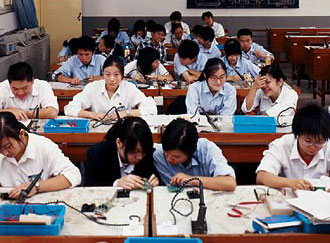Shanghai’s high schoolers are the world’s best in applying math, reading and science skills, according to a comprehensive survey of students in 65 nations released Tuesday.
Over a half million 15- and 16-year-olds in 65 nations sat last year for a two-hour exam as part of the 2012 Program for International Student Assessment (PISA) administered by the Organization for Economic Cooperation and Development (OECD). The OECD membership of 34 nations is generally deemed to include the world’s most advanced economies with a few notable exceptions, including Singapore and Hong Kong. China too is not a member.
Students from East Asia claimed seven of the top 10 places in score rankings, with Shanghai students far above the rest in each of the three areas tested. Their scores indicated that their educational attainment was equivalent to three more years of schooling than the global average in math, two more years in math and a year and a half more in reading.
Shanghai scored 613 points compared with the OECD average of 494. Singapore came in second with 573, followed by Hong Kong, Taiwan, South Korea and Macau. Peru had the lowest score of 368. The US scored 481 points, well below the OECD average. The UK ranked 26th in math with scores at about the average level among OECD nations.
East Asia topped the charts for reading as well, led by Shanghai’s score of 570, about a full year’s worth of education above OECD levels. It was followed by Hong, Singapore, Japan and South Korea.
In science Shanghai scored 580, about two year’s worth of schooling above the global average score of 501. Finland was the only nation outside East Asia to break into the top five, scoring just behind Shanghai, Hong Kong, Singapore and Japan.
What makes Shanghai’s performance so impressive is that the test goes beyond measuring knowledge that can be obtained through rote memorization to evaluate students’ ability to apply classroom knowledge to real-world situations.
“The biggest surprise from Shanghai… was not that students did well on reproducing subject matter content but that they were very, very good in those higher order skills (that reflect) what you can do with what you know,” noted OECD’s deputy education director Andreas Schleicher.
The PISA tests are given to student who have nearly completed their compulsory education in areas deemed “essential for full participation in modern society” and their ability to apply what they have learned to new situations.
“This approach reflects the fact that modern economies reward individuals not for what they know, but for what they can do with what they know,” said the report.
The high achievement of Shanghai’s students is attributed in large part to the success of the city’s educational system and social culture in inculcating in students the belief that their success is dependent entirely on their efforts.
“Practice and hard work go a long way towards developing each student’s potential, but students can only achieve at the highest levels when they believe that they are in control of their success and that they are capable of achieving at high levels,” said the PISA report.
“In China and Shanghai, you have nine out of ten students telling you, ‘It depends on me. If I invest the effort, my teachers are going to help me to be successful’,” Schleicher told CNN’s On China, a segment to air in December.
Recruiting and training quality teachers is considered an important aspect of Shanghai’s educational success.
“The teachers are very well-paid, very professional,” said Jiang Xueqin, a deputy principal of Beijing’s elite Tsinghua University High School. “The Shanghai government will spend a lot of resources in making sure that each teacher is well trained, has opportunities to go abroad, has opportunities to learn from the best teachers.”
Another factor likely to have contributed to the exceptionally high scores of Shanghai’s students is the fact that the city’s population comprises an extremely high concentration of China’s most affluent and cosmopolitan families. In terms of socioeconomic composition, the Shanghai sampling would be akin to students from the affluent suburbs of New York City, San Francisco Bay and Washington DC. The role played by that socio-economic skew will become more apparent when PISA adds other regions of China to its annual testing beginning in 2015.


